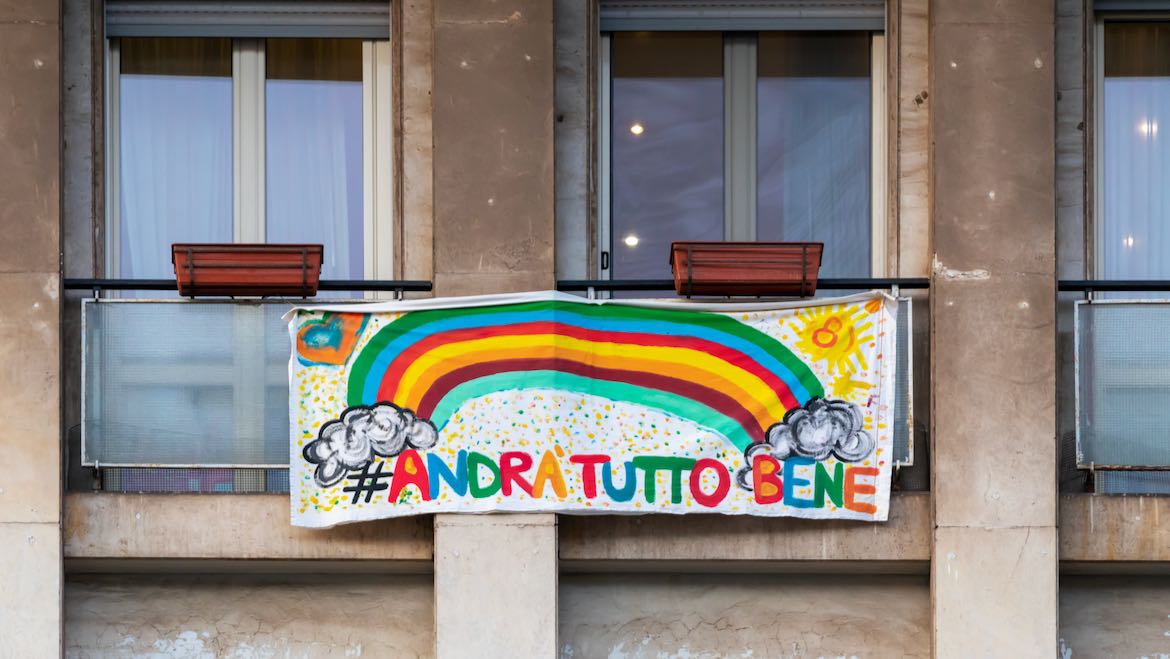Public media are essential business: Lessons from Italy in the era of COVID-19

Gennaro Leonardi / https://www.shutterstock.com/g/GennaroLeonardi
A sign on a balcony in Rome April 5 says "Everything will be fine."
In Italy, one of the significant lessons we are learning in this pandemic era is the importance of our crown jewels: our public services, which are crucial in all areas of our economy and society. Besides our excellent public health care system and public education (including higher education), we have our public service media, RAI Radio Televisione Italiana, which has provided information, entertainment and even some comfort in these tragic times.
RAI, founded in 1954, commands an audience of over 35% of TV households in Italy and is funded through a mixed system of advertising and taxpayers’ money. The license fee, collected through the electricity bill, is approximately $90 a year per family. RAI operates free-to-air as well as subscription channels. Its TV channels compete against two main competitors: Mediaset, owned by Silvio Berlusconi, former prime minister and leader of the opposition party Forza Italia; and La7, previously owned by the telecommunication giant Telecom Italia and in the hands of Cairo Communications since 2013.
From television to radio, over the air and online, the public media system has been our companion since the lockdown began in early March. During this emergency, the predictable flow of shows, especially in the case of over-the-air television and radio — from entertainment to political talk shows, from news bulletins to the regular 6 p.m. appointment for daily reports from the Italian Institute of Health — have brought a sense of daily structure to what might otherwise have been an incessant and sometime confusing flow of information coming through our individual news feeds.
Our public media have contributed to reinforcing a sense of national unity in the face of this tragedy, especially for the elderly and for children, some of the most affected segments of the population. The collective watching of the daily news, a film series or talk shows has provided us with a shared experience across the country.
Radio has been particularly important and is worth a special mention. The expansive and multifaceted RAI Radio system has lightened our days, bringing gentle voices into our otherwise solitary confinement. RAI Radio comprises 12 channels, which include Radio RAI1, the generalist channel; Radio RAI2, a favorite of younger audiences; Radio RAI3, the more “intellectual” channel, featuring a variety of music genres, public affairs, cultural programming and experimental formats; RAI Radio Kids, a wonderful auditory experience for children; and many others.
RAI has also instituted a Fake News Task Force to support individual newsrooms dealing with the spread of false information about the virus that has fueled various conspiracy theories. In fact, public media’s historic mission, which is to provide information and entertainment to all, regardless of income or geographical location, becomes particularly meaningful during the COVID-19 pandemic, when we all need to feel that we are in this together, in solidarity, fighting for a common cause.
Public media are important not only because they provide information and entertainment and support online education through their various services, including audio and visual archives and a dedicated history channel (RAI Storia), but also because we can trust them during an otherwise nerve-wracking period characterized by mistrust and fear. A renewed ethos of the public sphere needs to be built around the need to reinforce trust and inclusion in our communities: Public media are inherently equipped to do that.
This emergency has confirmed that the neoliberal consensus, based on reducing taxes and promoting massive commercialization and privatization of our industries and services, has failed. The market, by its very nature, divides us, addressing us as individual consumers rather than citizens, bombarding us with ads and continuous solicitations to make purchases. But especially during these times, fast montage and a barrage of ads can only contribute to a sense of heightened alert and social anxiety.
Commercial media are important, of course, but they are not fit to provide the unity and solidarity we need in order to find comfort in our shared humanity, to think, reflect, pause and, by doing so, resist. This national and global tragedy has shown us that we need to reassert our priorities and that public media, like other public services, are essential to our lives.
Cinzia Padovani, Ph.D., is Associate Professor at the College of Mass Communication and Media Arts at Southern Illinois University. In 2018 she won a prestigious Marie S. Curie Fellowship to study ultra-right media and communication at the University of Loughborough (UK), with a Secondment at the Scuola Normale Superiore of Florence (Fall 2019–Summer 2020). Padovani has written extensively on public service media, alternative media and Italian and European media.





